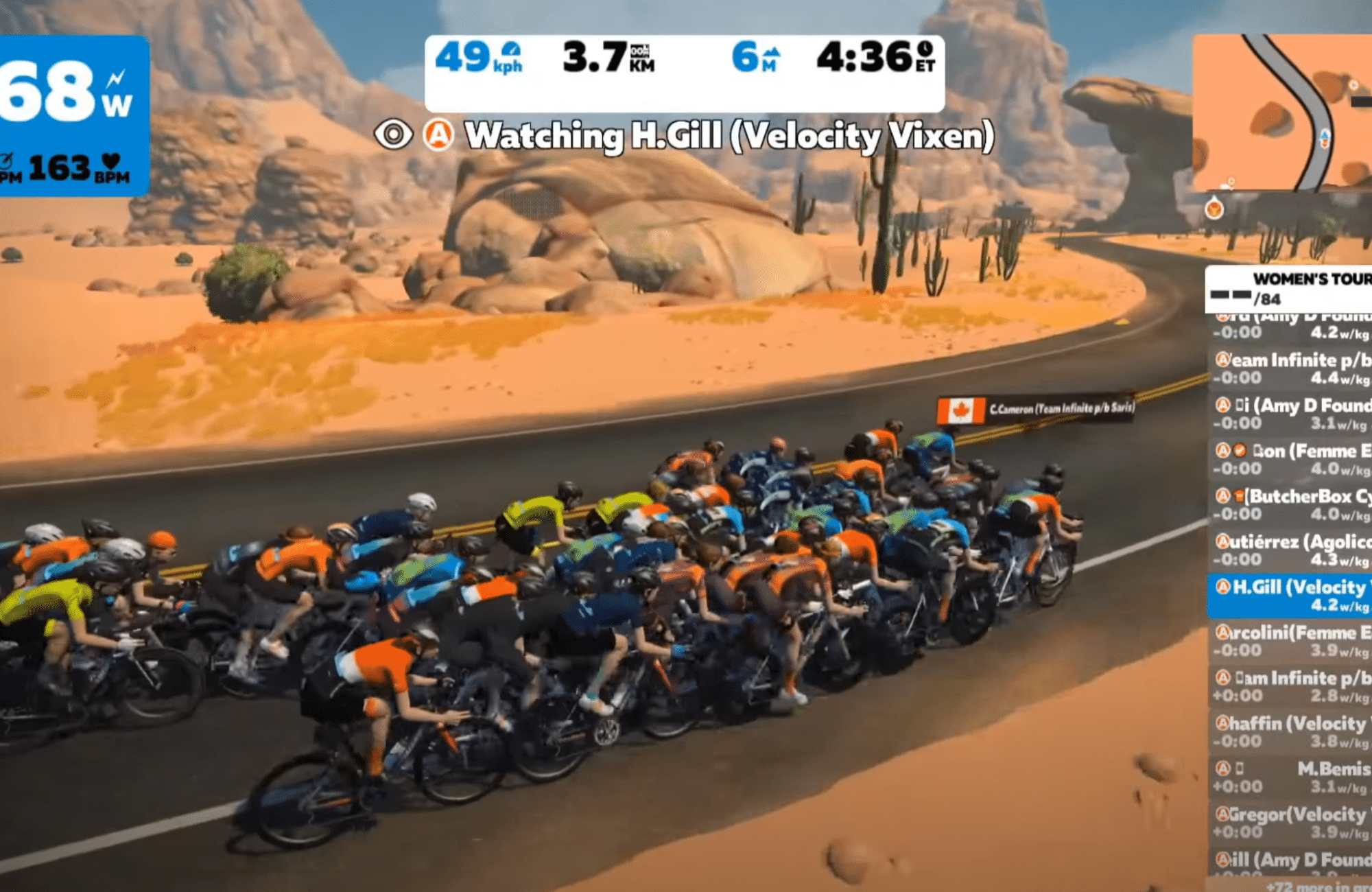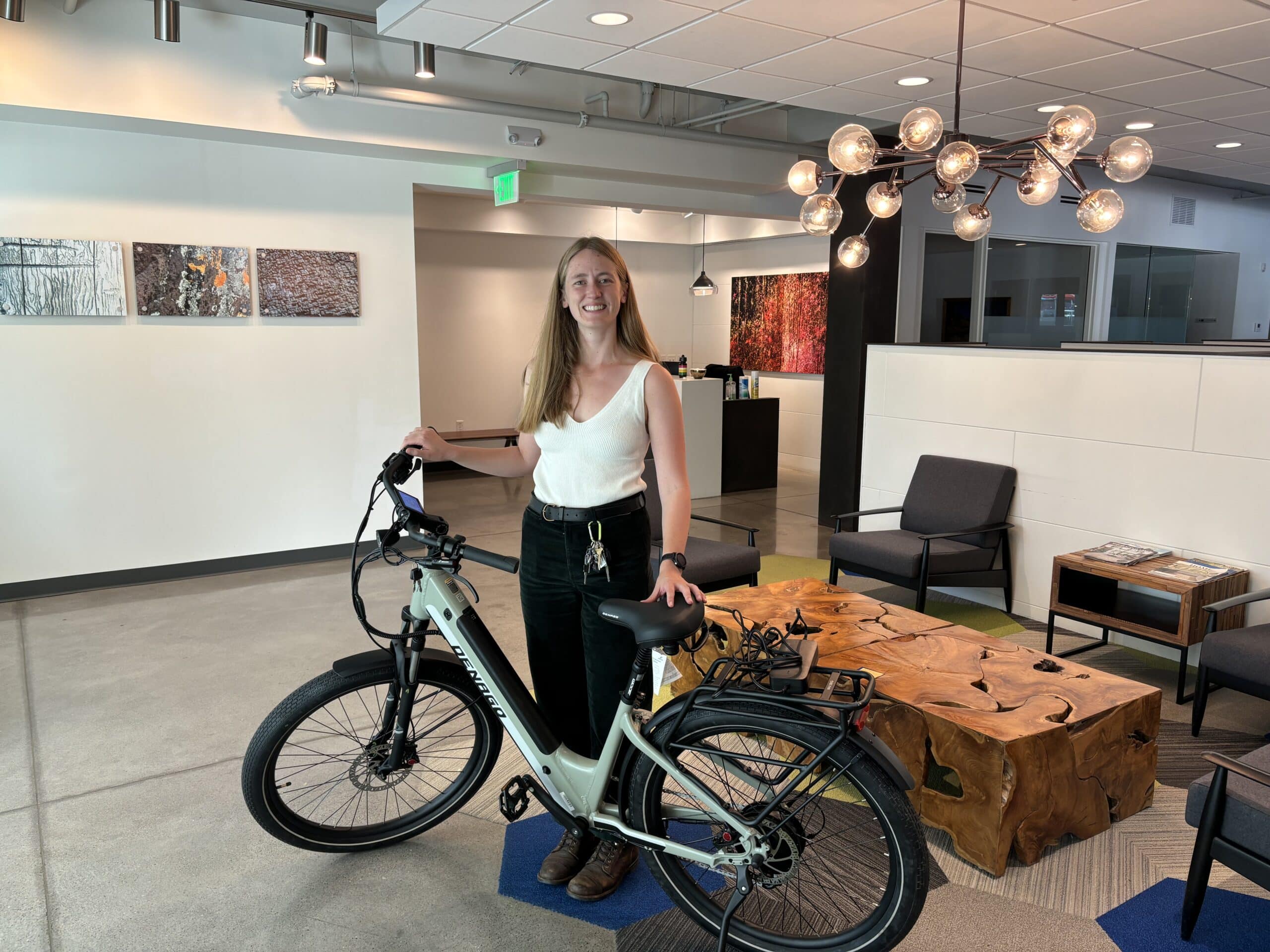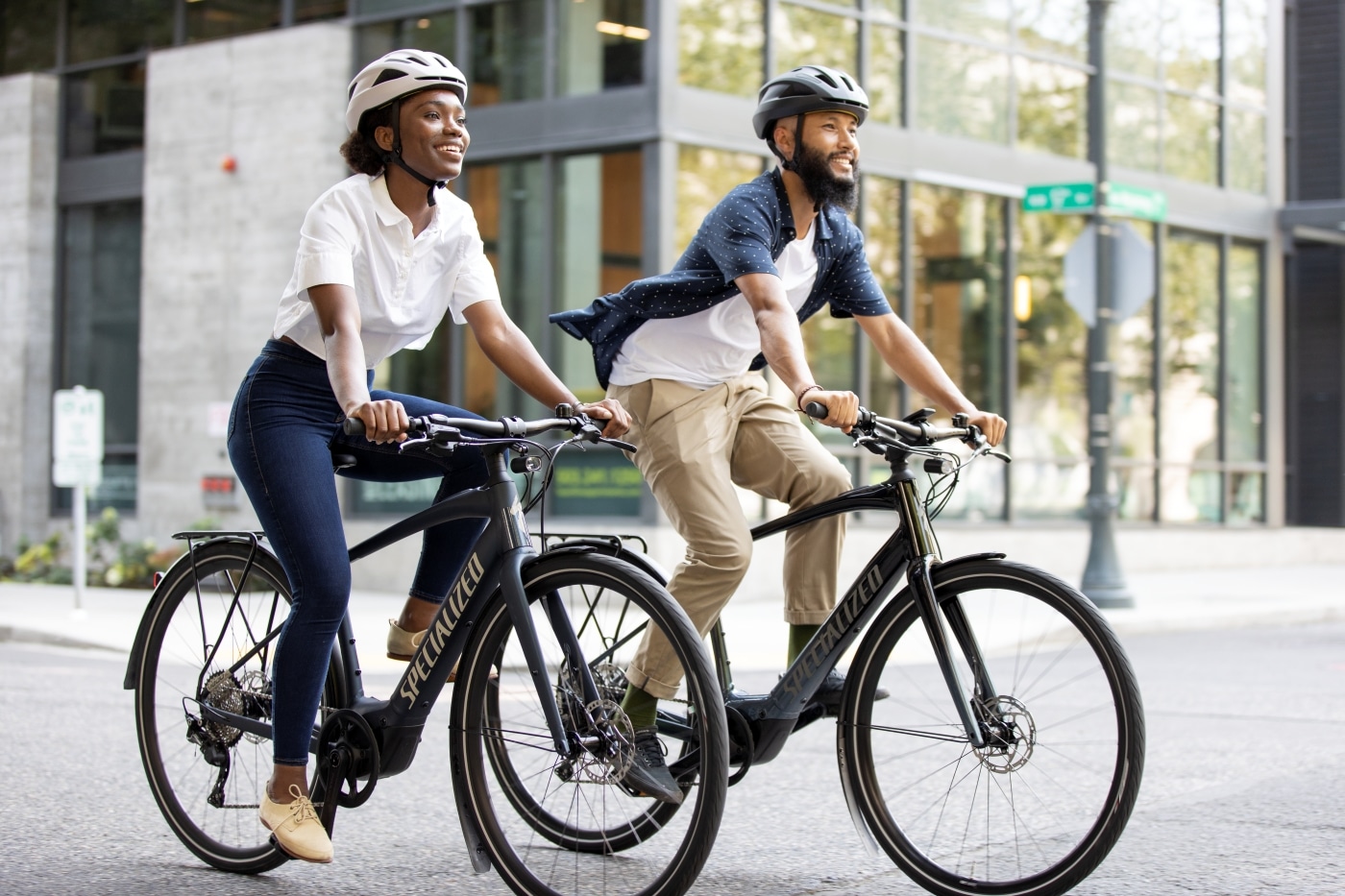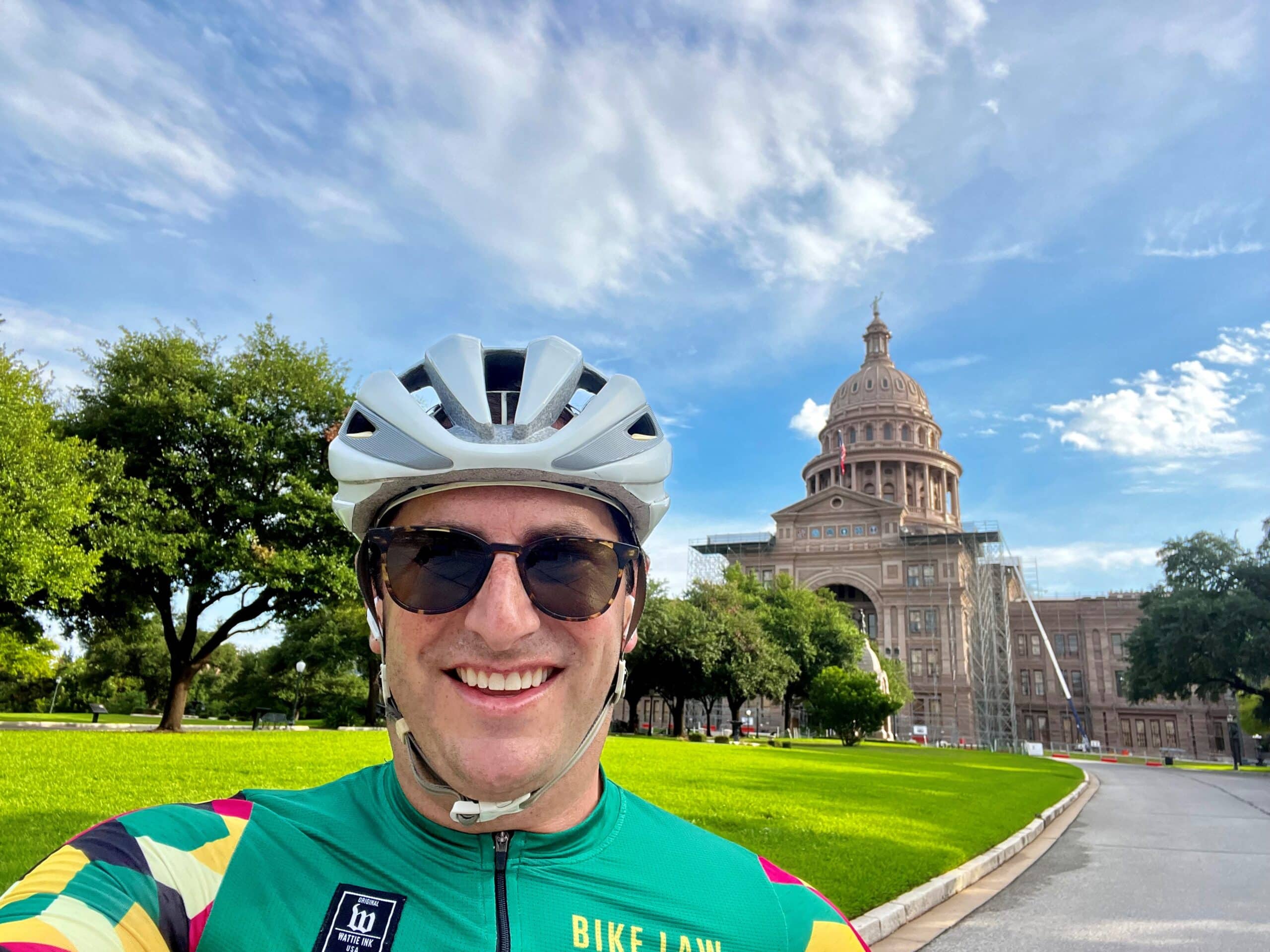How cyclist Eric Hill brought virtual racing to America’s top bike races.
As a result of COVID, I’ve spent significantly more time riding indoors. Many of our group rides have temporarily disbanded, not to mention our pleasant spring weather in Texas and Louisiana has been pushed aside by harsh summer heat and humidity.
I / Bike Law Charlie don’t feel entirely disconnected though, because I love running across my real-life riding friends on Zwift. I usually hit my limit on Zwift in about an hour, which means I get to cover around 20 miles. Still, the intensity of an hour on Zwift far exceeds an hour of outdoor riding, where I’m likely to put a foot down a few times based on traffic or stopping to snap a picture of an alligator on the edge of a marsh. I enjoy outdoor riding more but appreciate the indoor efficiency – and, now, the necessity – of a Zwift ride.
My own experience with riding on Zwift, coupled with seeing headlines about professional racing turning into virtual bike racing this year, inspired us at Bike Law to dig deeper into how pro racers are competing virtually. Our quest led us to one person, Eric Hill, a coach, cyclist, veteran, and the founder of Project Echelon Racing.
The Project Echelon Racing team’s mission is clear: They “educate, equip and empower veterans through physical activity,” namely competitive outdoor cycling. That mission expanded this spring when Project Echelon co-founder and president Eric Hill realized the coronavirus pandemic was threatening to sideline his team and other cyclists from competing in three of the most prominent races in North America: the Redlands Bicycle Classic in California; the Tour of the Gila in New Mexico and the Joe Martin Stage Race in Arkansas.
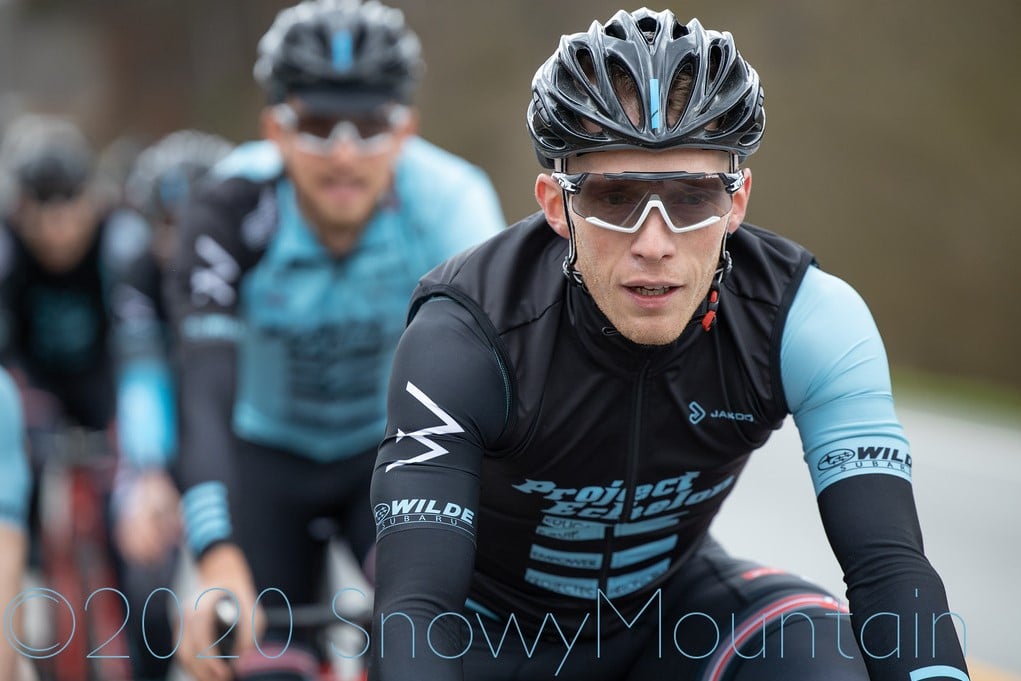
The new mission, as Hill saw it, was to ensure cyclists could still compete this year, this time with the aid of technology that until this year had been popular mostly among indoor cycling enthusiasts who use stationary bikes. Like these enthusiasts, outdoor racers often use “trainers” that fit a bicycle of the user’s choice and are perfect for workouts and preparation — especially in weather not ideal for outdoor rides. To upgrade a trainer setup for use in online technology like the Zwift app, a cyclist adds a “power meter,” which measures the force a cyclist applies to different parts of the bicycle — particularly the pedals and drive train. The technology makes virtual bike racing possible.
Cyclists complete such a setup with fans to cool them during a session and a computer with a display that takes them through a race visually. Riders can also connect to their team through the Discord platform, which allows them to communicate during races.
We asked Hill to take us through the setup in preparation for the Tour of the Gila, which was slated for early April but was canceled in March as the coronavirus took hold of much of the country.
Virtual Bike Racing: Interview with Eric Hill
Bike Law: How did you get into a situation where you were suddenly setting up virtual bike racing?
Eric Hill: With the coronavirus coming through, racing was taken away from my team, and we’re competitors — that’s what we love to do. So we started exploring new ways to get that extra bit of motivation, that excitement, back in our regimen. At first we started doing Strava challenges, but it just wasn’t quite meeting our needs.
BL: And Strava challenges are competitive, but you’re not competing together even though you go on the same course, right?
EH: Right, you can see a leaderboard but there’s nobody else out there — it’s just me and the clock. It wasn’t the same as racing. We wanted to connect with cycling fans, we wanted to connect with our veterans. When we go out racing, we most often try to visit a VA or a Legion Post or host a veteran event. We weren’t able to do that either, so we were looking for ways to reach our goals, and how do we as a team compete and try to connect to one another?
BL: How did you get into Zwift?
EH: We started with meetups, which is a free feature with Zwift and anyone can set it up. We picked some courses, sent some invites across the professional peloton we have and we asked if they wanted to join us. It got really competitive and we had people asking to join us who weren’t invited. At that point, I reached out to a friend of mine, Nathan Guerra, who owns and manages a company called Zwift Community Live. Nathan is one of the first live broadcasters and live announcers for Zwift races. He said ‘I’m interested, but if I’m going to do it, I need to make sure we’re going to have top-level teams there and we’re going to have media coverage.’ That sparked the idea of reaching out to races that had been canceled or postponed, so I reached out to the three major stage races in North America.
BL: What was the ask?
EH: Can I help you meet some of your sponsorship requirements and be put in the public eye by hosting a virtual event in your name, and can I reach out to all of the teams that would’ve been invited and ask them if they can get into virtual races? I got permission from the Redlands Bicycle Classic, and that put together the framework for the rest of the races. That’s when I reached out and said I had media coverage, they are going to embed livestream broadcasts, they’ll do power analysis articles, they’re all in. The event directors were extremely excited about the opportunity to still host a race.
BL: From what you said so far, it sounds like the logistical aspects were the tougher thing to put together as compared to the technical requirements.
EH: The technical side of things was identifying the course and making sure everyone has a Zwift power account and verified data: weight verification and power verification.
BL: How do you put together a course on Zwift that’s comparable to an actual race?
EH: In Zwift, you don’t build the course. They build the course. Zwift is basically the roads — they are the venue. I get to choose the roads I want to race on but I can’t change the roads. I’m the race promoter and organizer so I determine how the race is going to take place on those roads. To a degree, I’m able to say ‘I want to string two courses together,’ and I was able to find a climb that was 20 to 25 minutes long, and in my head, I can say that’s similar.
BL: What does it take to participate in virtual bike racing?
EH: For these events, it’s invite only, so I’m inviting people who either have a professional license or a domestic license. Regulations for E-Sport racing are quite rigorous and robust. You have to have dual power meters for power verification, you have to have a heart monitor, and I didn’t want that. So for our event, all you need to have is a weight and height verification and all you need is a power meter, and that needs to be able to connect via Bluetooth, and you’re in — game on. And we don’t require a smart trainer. We have some guys racing on rollers, some on a traditional trainer and others are on smart trainers.
BL: Did most cyclists already have the equipment needed?
EH: The majority of elite cyclists train with power and have power meters. And the majority have some sort of trainer, whether it’s rollers, a traditional trainer or a smart trainer. In the Northwest, the Midwest, the Northeast where there’s snow on the ground a good portion of the year, most often, those guys will have a smart trainer. That’s the only way to train at the level we do. To get in at the most basic level, it would be about a $500 investment.
BL: Did you get the sense that most of the racers were doing it for the first time?
EH: Oh for sure. The first event I put on was my first time ever racing. Before that it was only training, just because I had my typical training routine and individually, I didn’t need to race. A lot of guys were in that same position.
BL: Now that people are being introduced, do you think people are more open to virtual bike racing? Because at some point, we’ll get through this and be back to road racing.
EH: My hope is that this is a supplement to real-world racing. There’s always going to be the e-sports side of things where racing virtually is what they want to do every day, and that’s a totally different demographic. I respect them and they’re amazing athletes, but that’s what they do. Then there’s the folks who have a love and passion for racing on the road and the feeling you get reeling a corner at 35 miles an hour, and that will never be replaced. But I think e-sports racing will supplement that to a high degree.
BL: For those who were familiar with a race like Tour of the Gila, what was their critique of the virtual bike racing courses?
EH: Gila is an animal. The stages are long, the climbs are long, the terrain is desolate and you’re fighting heat and altitude. Those are all things you just can’t replicate virtually. So I think there was an appreciation for the virtual racing and how hard it was and we made an attempt to simulate elements of the Gila, but it’s not the same. If you go in with the mindset it’s the same, you’re going to be disappointed. If you go in with the mindset that this is something new and different, it’s positive. You have to learn a new skill. I have an opportunity to grow and we’re all competitors and that’s what we want to do.
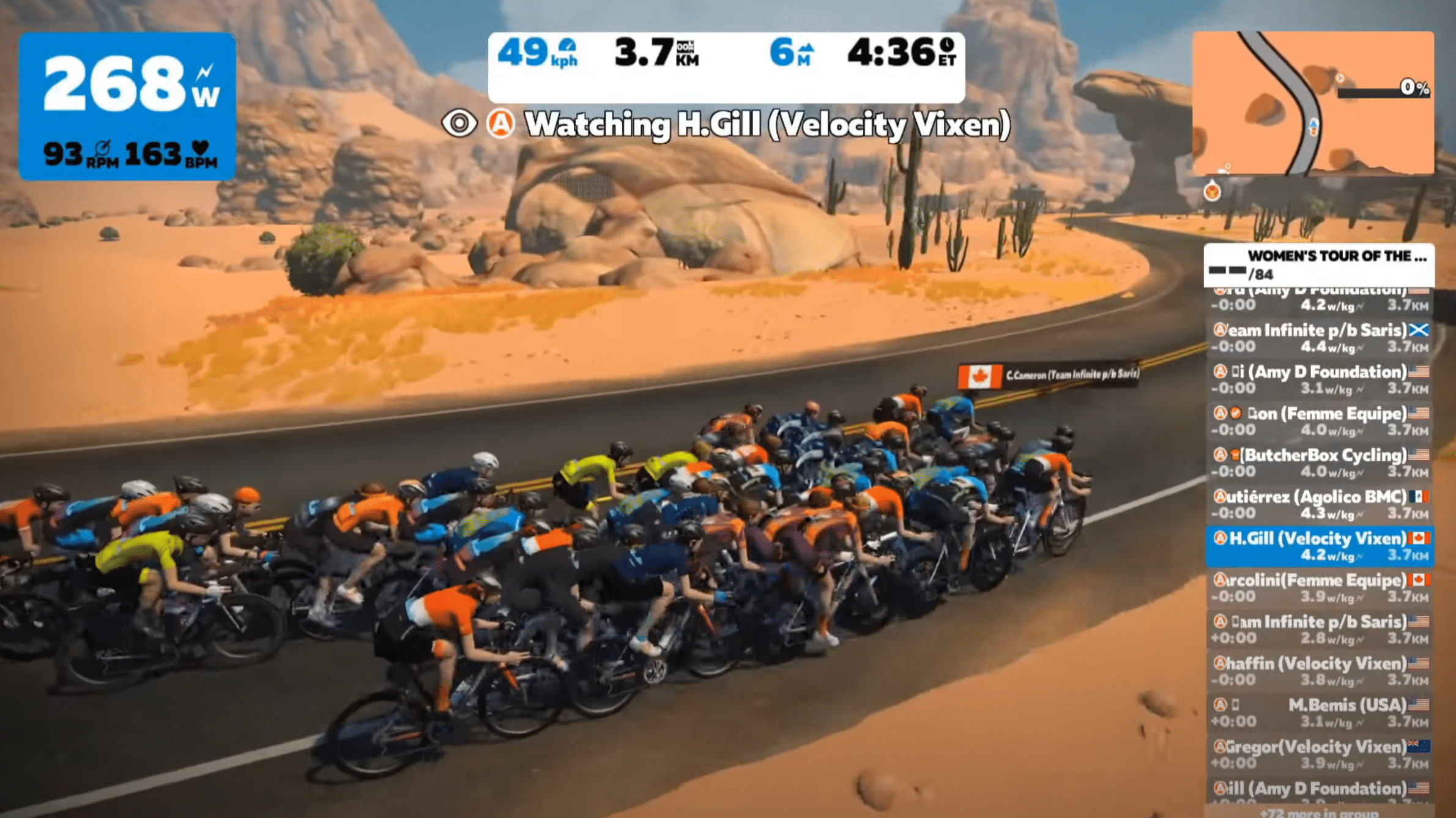
BL: You had a lot to do with Project Echelon as it was. Was this a big time suck?
EH: I still have a 40-hour week job, 20-hour a week training schedule, two kids and a wife. I’ve been doing this between the hours of 8 pm and midnight for probably 30 hours a week.
BL: Is that sustainable?
EH: No. But once we develop a stronger relationship with Zwift and we have greater access to things so I don’t have to manipulate data on the back end, then it’s sustainable. We’re getting there and I think we caught the eye of the virtual community and I plan on continuing to put on races. I think it brought great value to teams across the world, especially for teams that were really struggling. I have no reason to stop because it benefited our organization greatly.
BL: On that front, how were you able to fulfill your mission?
EH: We wanted to have a platform to grow Project Echelon and give them an opportunity to compete against high-level athletes and do the same for their teams. Teams participating are asked to make a donation to Project Echelon, so while I’m giving back to give them an opportunity to race, they’re giving back to the organization. We raised just over $7,500 over five races we put on. All of that money went to our veterans’ organizations. It helped with getting them equipment, helped get them training, nutrition — giving them an opportunity to experience what it’s like to be a supported athlete. That’s made it easier for me to dedicate the time and energy because I know we supported over 104 veterans and we’re helping men and women who need it. My time is worth saving a life and giving someone that kind of support.
Complete footage of the 2020 virtual Tour of the Gila is available on YouTube, including a short highlight film here:

Charlie is a bicycle accident lawyer in Louisiana, Texas, and Mississippi and a member of the Bike Law Network.
Having served as the president of the Texas A&M Cycling Team, where he led the team in appearances in the U.S. Collegiate National Championships, Charlie has spent thousands of hours riding his bicycle in Texas.
